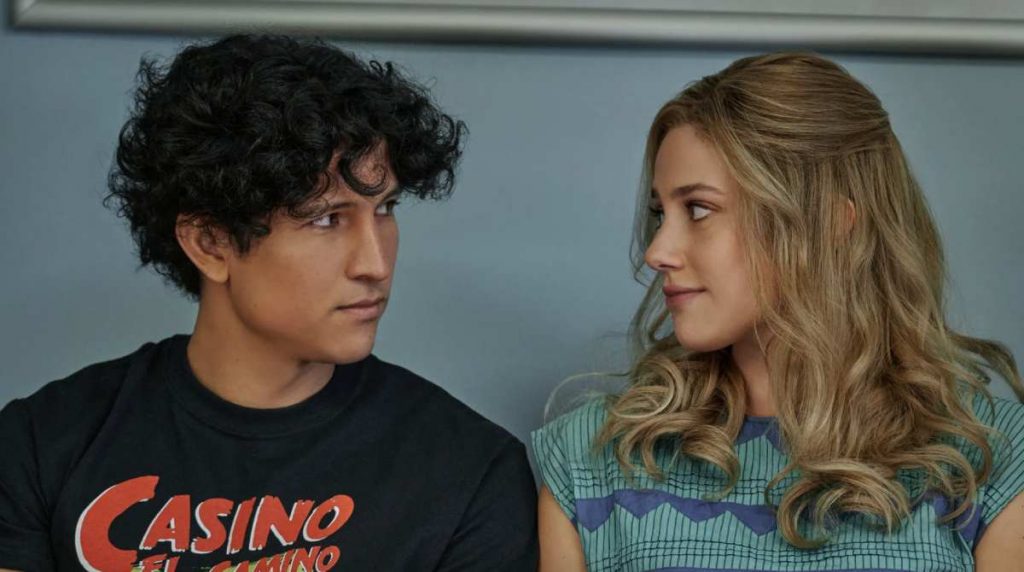
"Look Both Ways" starring Lili Reinhart was supposed to be an empowering drama about unplanned pregnancies. But somehow the math doesn't add up. A pregnancy drama – but with a feel-good character? Can that go well? In the Netflix drama "Look Both Ways" with Lily Reinhart, which premiered on August 17, somehow not …
"Look Both Ways": That's what the Netflix drama is about.
Lili Reinhart plays Natalie, an aspiring illustrator and animator whose fear of pregnancy is shown in two different ways in "Look Both Ways." We watch as parallel versions of Natalie – the one who gets pregnant after a one-night stand on the eve of her college graduation and the one who doesn't – live their lives simultaneously in two different universes.
The starting point sounds promising: a young woman has to make a decision about her body, her career, and every other aspect of her future. And there would be so insane amounts of potential here for a real and sympathetic portrayal of what leads to her decision to continue the pregnancy – even if it means putting her plans on hold. That's why it's all the more shocking and utterly incomprehensible to viewers:inside when, less than 10 minutes into the film, the pregnant Natalie just completely abandons her dream – and that of her best friend and roommate Cara (Aisha Dee): No move to Los Angeles, no first job at an animation studio; instead, she wants to raise a child as a single parent.
"Look Both Ways": This is what we would have liked to see
"Look Both Ways" follows Natalie through her life for about five years – admittedly quite a lot of time to fit into 111 minutes. As a viewer:in, one misses Natalie's motivation to become a mother at age 22 in the "pregnant" narrative. That's an omission in 2022 that unfortunately feels more like a desire for neutrality than a time-saving strategy. And neutrality, especially from such a star as Lili Reinhart, who was also an executive producer on the project, is not what we need right now. At a time when women in America – and especially in Texas, where Natalie lives when she becomes pregnant – are denied the right to make such a decision, the plot feels tone-deaf at best.
We would have liked to see Natalie pregnant in both timelines after her one-night stand, making the decision to terminate the pregnancy in one universe while continuing it in the other. At the very least, an explanation of how she and her parents came to an agreement would have added a bit more realism to the situation. After all, they take her in after she graduates from high school. Instead, the only conflict between the pregnant Natalie and her parents is a minor argument when she wakes up to find her parents working out in her bedroom on the equipment they placed there while she was in school.
The performances by Lili Reinhart and Aisha Dee, as well as Natalie's lovers, played by Danny Ramirez and David Corenswet, are charming enough that you can at least watch the film while scrolling Instagram. The sense that you're watching "pro-life" propaganda, however, keeps you from identifying with any of the actor:s. That's even true of Luke Wilson, our eternal crush of the 1980s, who is apparently old enough now to play 25-year-old Lili Reinhart's father.
Here's what's most disturbing about "Look Both Ways" on Netflix.
What felt most disingenuous, however, was the film's ending. Both of Natalie's paths lead to the same outcome – she gets the man of her dreams (of course), the job of her dreams (and the opportunity to showcase her work at the "South x Southwest" festival), and a happy ending. Is that possible in real life? Of course it is! But like the rest of the film, the depiction of events with the pregnant Natalie seems too good to be true. Who watches over her daughter while she spends hours building her portfolio? How does she feed herself and the child through? While it is clear that she is privileged, the failure to even acknowledge this suggests that the filmmakers:inside may view her situation as the rule rather than the exception.
Director Wanuri Kahiu acknowledged in an interview with Variety that the film was released two months after the Roe rule was introduced, but ultimately "Look Both Ways" is not necessarily about a decision."
This is how "Look Both Ways" defends itself against the accusations
"There is a happy ending, and there is no life worse or better than another," says Lili Reinhart, "and I think that was the goal of the film. What we wanted people to take away is that you have options and you don't have to live your life a certain way to be happy."
As much as we want to believe that what Lili Reinhart says in the interview is true, we had a hard time not being creeped out by "Look Both Ways." Perhaps we've experienced and seen too many things to believe that everything always ends well. In 2022, it's hard, and maybe even a little naive, not to be cynical about life and … metaphorically speaking, to look both ways. But pretending that everything will always turn out well is no solution either.

Written by Michael Zippo
Michael Zippo, passionate Webmaster and Publisher, stands out for his versatility in online dissemination. Through his blog, he explores topics ranging from celebrity net worth to business dynamics, the economy, and developments in IT and programming. His professional presence on LinkedIn - https://www.linkedin.com/in/michael-zippo-9136441b1/ - is a reflection of his dedication to the industry, while managing platforms such as EmergeSocial.NET and theworldtimes.org highlights his expertise in creating informative and timely content. Involved in significant projects such as python.engineering, Michael offers a unique experience in the digital world, inviting the public to explore the many facets online with him.
